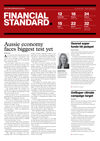Search Results | Showing 471 - 480 of 695 results for "net zero" |
| | | ... blue and grey hydrogen which further support fossil fuel extraction and complicates Australia's ultimate path toward net zero. These investments are certainly pushing Australia toward a greener economy, however are not nearly sufficient to drive and ... |
| | | | ... significant financial risk implications amongst others if we don't invest in protecting nature. If the world is to meet net zero targets, a step-change is needed to embed nature into business and financial decision-making, not least because nature ... |
| | | | ... in assets under management. More than a quarter of institutional investors globally have made a public commitment to net zero by 2050, with 31% of Asia Pacific-based investors making a public commitment to net zero emissions. "Looking at asset classes ... |
| | | | When BlueScope Steel announced last year it had set a 2050 net zero target, it was the beginning of a process to embed a decarbonisation strategy in a company in one of the hardest to abate industrial sectors. The commitment to reach net zero on scope ... |
| | | | ... the potential for strong investment outcomes to our members," said Hostplus CEO David Elia. Hostplus has announced a net zero 2050 target, as reported in Financial Standard. GREP is intended to deliver clean energy to the National Electricity Market ... |
| | | | ... reducing greenhouse emissions (84%), 83% want targets for emissions reductions and 81% want to see them pledge to achieve net zero by 2050. Social issues are also rising up the agenda - 74% of Australians say social issues are important when they think ... |
| | | | ... emissions, with the $14 billion super fund using new calculations as the basis for its interim planning to meet their 2050 net zero target. Active Super has calculated current fixed income emissions stand at around 538,000 tCO2e. By comparison, the fund ... |
| | | | ... momentum around the world, particularly after COP26 and seeing the number of countries are committed to working towards net zero emissions targets." Ausbil predicts the need for over US$5 trillion in capex globally between now and 2050 in order to add ... |
| | | | ... include National Australia Bank, landowners and companies in the Australian food supply chain. Australia's transition to net zero emissions requires decarbonisation at a significant scale, using every avenue open to us," said CEFC CEO Ian Learmonth. ... |
| | | | ... cities, health and wellbeing, ethical sourcing, agriculture and regional development, circular transition, diversity, net zero action, SME transformation, large business, youth and other categories. "The future of sustainable development in Australia ... |
|

















